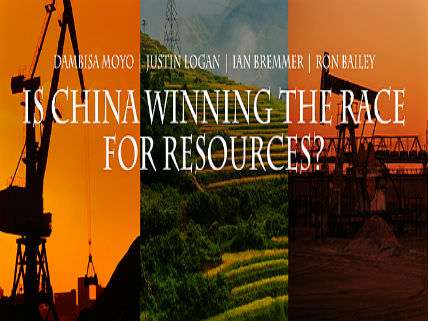Is China Winning the Race for Resources?: Ronald Bailey at Cato Unbound
"Racing" for resources is economically misconceived.

This month Cato Unbound is hosting a discussion on the question: Is China Winning the Race for Resources? The first essay on the topic is by economist Dambisa Moyo, author of the New York Times bestsellers Dead Aid: Why Aid is Not Working and How There is a Better Way for Africa and How the West Was Lost: Fifty Years of Economic Folly and the Stark Choices Ahead. Her third book is Winner Take All: China's Race for Resources and What it Means for the World.
In Moyo's initial essay, "Winner Take All: China and the Global Race for Resources," she argues:
Over the last decade, China has been buying up mountains and mines, agricultural land and oil fields, thus ensuring that it will have the upper hand in the future struggle for the world's resources. Scarce, finite, and rapidly depleting global supplies of land, water, energy and minerals – the inputs to foodstuffs, automobiles, mobile phones, computers, and other products of higher living standards – cannot match the demand emanating from a rising world population, rapidly increasing global wealth, and urbanization.
Despite the recent declines in commodity prices, the consequences of long-term fundamental supply and demand imbalances remain; the two most serious are substantially higher commodity prices and the rising risk of violent resource-based conflict. In the aftermath of the 2008 financial crisis, commodity prices increased 150 percent, and already there are around 25 conflicts raging around the world with their origins in commodities, with many more likely to occur over the next decade.
Besides me, the other participants in the discussion that will unfold over this month are Justin Logan, Cato's director of foreign policy studies and Ian Bremmer, the president and founder of Eurasia Group. The schedule of responding essays is by Justin Logan, July 8, Ian Bremmer, July 10; and Ronald Bailey, July 13. Discussion to follow through the end of the month.
Just a hint at my take: The current economic supercycle is now on the downward side and China's neo-imperialist version of mercantilism will turn out to be economically futile.
Show Comments (27)